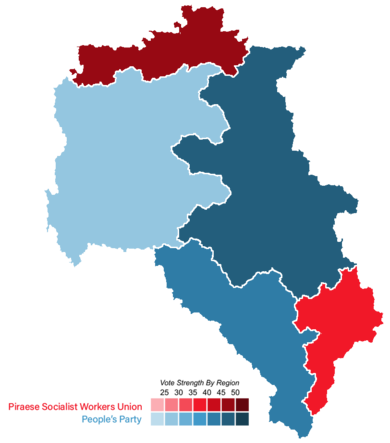1980 Piraean general election
| |||||||||||||||||||||||||||||||||||||
All 125 seats to the Piraean Courts 61 seats needed for a majority | |||||||||||||||||||||||||||||||||||||
|---|---|---|---|---|---|---|---|---|---|---|---|---|---|---|---|---|---|---|---|---|---|---|---|---|---|---|---|---|---|---|---|---|---|---|---|---|---|
| Turnout | 79.8% | ||||||||||||||||||||||||||||||||||||
This lists parties that won seats. See the complete results below. | |||||||||||||||||||||||||||||||||||||
 Most voted-for party by region in Piraea proper | |||||||||||||||||||||||||||||||||||||
| |||||||||||||||||||||||||||||||||||||
The 1980 Piraean general election was the first democratic election of Piraea after the military dictatorship to elect the members of the Piraean Courts (now Senate) and the new premier of the republic. It was extraordinarily held on 1 February 1980 and marked the start of the Piraean metapolitefsi.
The elections were agreed in 1979, after the military junta lost the national plebiscite in which it sought to legitimise a new leader. In September of 1979, the two largest parties of Piraea, the PSEE and the People's Party, signed, together with other minor legal parties, the conditions for the transition under the Hankssun 300 Pact; the military junta agreed the disassociation from the new government and institutions on the conditions of inmunity and the outlaw of the Piraese Section of the Workers' International. Most of the members of the illegal PTED participated under the Progressive Federation platform together with other clandestine leftist minor groups.
After the general elections the 1st Legislature of the Piraean Senate were formed, with an absolute majority from the People's Party, which counted with the PSEE as the main opposition party. The new premier, Ioannis Apostolou was invested with the votes of LK and Centre Union, while the post-Functionalist far-right proposed their abstention.
Background
1979 national plebiscite
The year prior to the general elections, the military junta proposed and celebrated a national plebiscite aimed to legitimise a new term of the recently elected junta leader, Ioannis Christodoulopoulos, who was appointed by the dictator of the Second Piraean Republic, Konstantinos Athanopoulos, in the minutes prior to his death. The plebiscite counted with an important campaign of the two options, "Yes" (Ναι; endorsed by the political right and the junta) and "No" (Όχι; endorsed by the left and society groups in clandestine), which gradually normalised political activity in the country.
However, the rejection of the junta's proposal, forced the military to initiate contacts with the political world to host elections and transition towards democracy. Christodoulopoulos held several contacts with the Ioannis Apostolou (People's Party) and Andrianos Rodiales (PSEE).
1979 Hankssun 300 Pact
The 4 September 1979, the military junta and the leaders of the main political parties signed the Hankssun 300 Pact, an agreement that specified the conditions of the metapolitefsi. The agreement became controversial in the cores of both the democratic right and most of the left, as it granted immunity to junta leaders and censored the Piraese Section of Workers' International from participating in the election. However, Apostolou and Rodiales argued that the pact was crucial for the dissociation of the army from the politics.
Campaign
Censorship and observers
Televised debates
Participating parties
| Candidacy | Leading candidate | Ideology | ||
|---|---|---|---|---|
| Ioannis Apostolou | Liberal conservatism Economic liberalism Christian democracy | |||
| Andrianos Rodiales | Progressivism Social democracy Secularism Pro-Eucleanism | |||
| Stefanos Sarropoulos-Larraz | Neoliberalism Liberal conservatism Right-wing populism | |||
| Nikos Procopiiadis [a] | Social democracy Democratic socialism Pro-Euclean Community | |||
| Theodoros Kouras [b] | Councilism Democratic socialism | |||
| Theofanis Kanatos | Progressivism Green politics Humanism Social liberalism | |||
| Dorotheos Apostolakis | Social conservatism Militarism | |||
| Charalambos Artinidis | Social conservatism Militarism Nationalism Piraean irredentism | |||
Results
Government formation and investiture
| Candidate | Date | Vote | Total | ||||||||
|---|---|---|---|---|---|---|---|---|---|---|---|

|
15 February 1980 Absolute majority required (61/125) |
Yes |
68 | 8 | 76 / 125
| ||||||
| No | 40 | 3 | 3 | 1 | 47 / 125
| ||||||
| Abs. | 1 | 1 | 2 / 125
|
Notes
- ↑ Democratic Socialism was a split from the PSEE after Rodiales signed the Hankssun 300 agreement with Apostolou and the military junta; the party merged again with the PSEE in 1993.
- ↑ Progressive Federation was the political brand that used several members of the PTED during the elections, since the party was considered illegal by the Ministry of Interior and Information; Progressive Federation was refunded as PTED in 1982.






